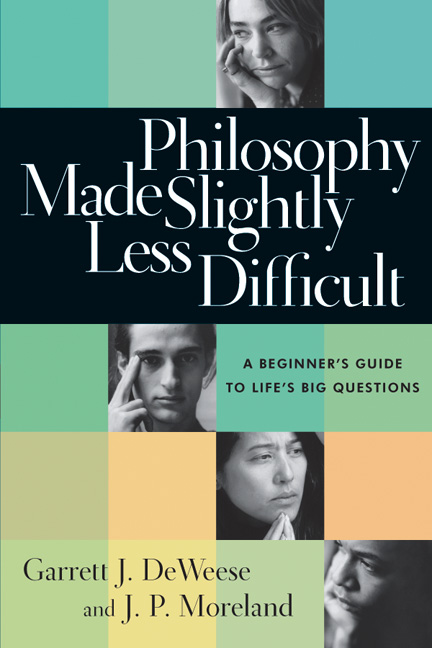Garrett DeWeese and J.P. Moreland: Philosophy Made Slightly Less Difficult
 Garrett J. DeWeese and J.P. Moreland, Philosophy Made Slightly Less Difficult: A Beginner’s Guide to Life’s Big Questions (InterVarsity Press, 2005), 170 pages.
Garrett J. DeWeese and J.P. Moreland, Philosophy Made Slightly Less Difficult: A Beginner’s Guide to Life’s Big Questions (InterVarsity Press, 2005), 170 pages.
Over the last two centuries the confidence of Christians in the reasonableness and credibility of their faith has met significant challenges from a number of quarters. With the almost wholesale acceptance of a naturalistic account of the origin of our species, and a growing conviction that science can explain everything about the world without the need to invoke the “spooky” supernatural, the floodwaters of unbelief have been rising about the Church on all sides, greedily devouring the grounds for faith and certainty. All the evidence, we are told, points to the non-existence of a benevolent God, the obsolescence of religion, and the absence of any justifiable grounds for the Christian hope of the resurrection.
However, the authors of Philosophy Made Slightly Less Difficult are convinced that the real nature of the challenge that faces us today “is not really scientific or theological or anthropological, but philosophical.” It is how modern man thinks about science and the universe that skews his view of the Christian faith as something irrelevant and outmoded. We wrestle not against evidence from laboratories, but against materialism, against scientism, against the naturalistic worldview of the West, against doctrines and ideas that have become entrenched in the modern mind chiefly through the Church’s neglect of the intellectual life.
Moreland and DeWeese seek to redress this problem by making philosophy more accessible to laymen, and by providing the outlines of a Christian perspective on a number of important philosophical issues, including ethics, metaphysics, the mind-body problem, philosophy of science and epistemology—all that in a mere 170 pages! As one who is still very much a beginner in these things, I am, perhaps, reasonably well positioned to make some sort of judgement as to whether or not they have succeeded in opening up these areas of inquiry to non-experts.
There are, I think, at least two sorts of pits into which a project of this sort may stray. On the one hand, in its efforts to achieve accessibility it may produce something so superficial that it is basically of no help to anybody; its contents are grasped easily enough because it avoids saying anything very important. On the other hand, in its attempts to attain conciseness, clarity and simplicity may be dispensed with altogether; the writers dash from one difficult problem to the next, without ever really explaining to anybody’s satisfaction what exactly it is they are talking about.
Perhaps it is inevitable that such a project as this one should gravitate towards one or the other of these two extremes. Philosophy is a difficult subject, and a genuine grasp of even the basics is not something to be had in a weekend’s read. In my estimation, Philosophy Made Slightly Less Difficult attempts to bite off more than can be chewed in a single paperback of these proportions, producing an uneven volume that varies noticeably in perspicuity and in its level of difficulty across the different chapters. Whilst some sections should be quite comprehensible for the beginner (for example, the chapter on philosophy of science), other parts prove much less digestible (such as the discussion of the mind-body problem) without a prior acquaintance with the subject matter. This is rather frustrating for the beginner, who might have walked away with a better understanding of some of the issues, had the authors contented themselves with saying a little more about a little less.
Category: In Depth, Summer 2006


